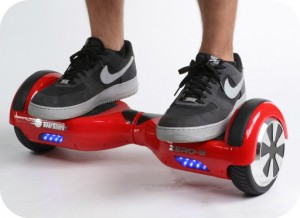 For many inventors, creating a machine that’s functional as well as popular can feel like striking gold, even if the actual material reward for their work isn’t exactly golden. That’s the situation Shane Chen found himself in since inventing the “hoverboard,” a two-wheeled, Segway-like vehicle that doesn’t quite float but has nevertheless been flying off the shelves. Unfortunately for Chen, many consumers are buying hoverboards from companies that have not paid him for his patented design. Instead, consumers are taking Continue reading
For many inventors, creating a machine that’s functional as well as popular can feel like striking gold, even if the actual material reward for their work isn’t exactly golden. That’s the situation Shane Chen found himself in since inventing the “hoverboard,” a two-wheeled, Segway-like vehicle that doesn’t quite float but has nevertheless been flying off the shelves. Unfortunately for Chen, many consumers are buying hoverboards from companies that have not paid him for his patented design. Instead, consumers are taking Continue reading









